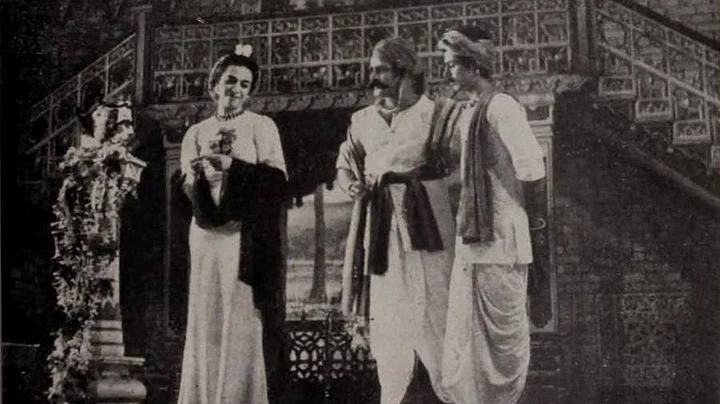It’s August 1945. For those seeking entertainment amidst the growing political turmoil, there’s much excitement. Prithviraj Kapoor is launching his new play, Deewar, at Bombay’s (now Mumbai) Royal Opera House. But the audience is in for a bit of shock. What initially appears to be a sedate family drama revolving around two brothers torn apart by the conspiracies of a foreign woman, turns out to be a politically loaded cannon. And when an actual wall or deewar comes up on the stage between the brothers, the crowd has no doubt about what Prithviraj is pointing at - Partition.
Only, Partition was still two years away.
The iconic play not only reflected Prithviraj’s political astuteness, but also his willingness to take on the powers of the day. Deewar, co-written by him and Inder Raj Anand and starring Prithviraj himself and his sons (Raj, Shammi and Shashi Kapoor), Zohra Sehgal and Damayanti Sahni at various times, ran to packed houses. But it encountered vehement political opposition, especially from the Muslim League, for its strong stand against Partition.
It did not help that Kapoor gave passionate speeches at the end of each performance, urging the audience to fight for unity and communal peace. But, says Kunal Kapoor, Prithviraj’s grandson, who now runs the iconic Prithvi Theatre, protesters eventually relented after Prithviraj invited anyone, who had concerns, to watch the play.
“The agitation led to anxiety about law-and-order and the play was even shut down for a few days. I have seen an advertisement saying that Deewar is coming back again after a gap,” says Sangeet Natak Akademi and National Award-winner Sunil Shanbag, who is now re-imagining the play 73 years on.
Deewar will flag off the Prithvi Theatre Festival 2018 on 3 November at the Royal Opera House - incidentally on Prithviraj Kapoor’s birthday.
It stars Sudhir Pande, Trishla Patel, Kalyanee Mulay, Raghav Dutt, Abhinav Grover, Dhammrakshit Ranadive, and others.
“Prithvi Theatre has been playing with the idea of producing some of Prithvraj Kapoor’s plays for a while now. Kunal approached me and I read the 6-7 scripts that are available and chose to do Deewar,” says Shanbag.
“Deewar is an allegory on colonisation and the events leading to Partition and it’s very interestingly framed. I thought it would give us an opportunity to look at a very critical period in Indian history vis-a-vis contemporary times.”Sunil Shanbag, Director, Deewar
Deewar is one of the four plays (along with Pathan, Ghaddar and Ahooti) of Prithviraj Kapoor’s Partition Quartet that was performed under the aegis of his Prithvi Theatres group.
The drama company consisted around 150 people including carpenters, painters, managers, booking people, technicians, 12 musicians, writers, actors and more. And Kapoor travelled across the length and breadth of the country through small and big towns with his plays that found a resonance with the audience with their contemporariness.
His son, the late Shashi Kapoor and the co-founder of Prithvi Theatre had said in an earlier interview to Rediff:
“My father’s basic request or dictum to the writers was to write plays that dealt with contemporary problems. Partition was about to happen and he wanted the anxieties of the people to be dealt with in their plays.”Shashi Kapoor
Today, of course it’s impossible to replicate the scale of the original play.
“Prithviraj had just some 50 to 55 actors. And he himself was a larger than life presence. There’s no way we can match up to that scale of production.”Sunil Shanbag
What Shanbag has taken care of instead is not to intervene much with the original. “People from across the country are saying on social media that they remember watching Deewar. It’s truly iconic and anyway I don’t mess around too much with text, especially one coming with a particular historical context,” says the veteran writer-director-producer, who has worked on the play for months alongside four academicians who helped him with the research.
“The original Deewar is 3.5 hours long, which will not work today. So some editing was necessary. What I have done is use a dramatic device to intervene and illuminate the play keeping the contemporary times in mind. In 1945, there was a certain understanding of politics and colonisation; 2018 is completely different. I have tried to bridge that using these interventions.”Sunil Shanbag
The main challenge, says Shanbag, was to make the play relevant, to ensure that it’s not a “museum piece”.
“Partition is a reality today unlike in 1945. We have been dealing with it since the last 71 years. The metaphoric “deewar” exists. So today, what is the wall a metaphor for?”Sunil Shanbag
What the re-imagining of Deewar in 2018 attempts to do is question why we need to keep the “other” alive to define ourselves. “The Partition was a horrific tragedy which tore apart lives like never before. But the victims themselves eventually moved on, they didn’t pass on the hate to the next generations. But it is the political establishment which constantly keeps the wound alive. This is something the play ponders on,” he says.
Kunal Kapoor too feels that the contemporary audience would have no trouble relating to the play.
“I think Prithviraj Kapoor’s plays at the core are very relevant today. They are about human conditions that have gone on for thousands of years under one pretext or the other.”Kunal Kapoor
For Shanbag, it would be enough if the play stokes some thoughts. “Prithviraj started a conversation with Deewar in 1945. Theatre is not as influential today. It would be enough if some of those who come to watch the play go home asking themselves a few questions,” he signs off.
(Deewar will be performed at the Prithvi Theatre and the Royal Opera House between 3 and 12 November as part of the Prithvi Theatre Festival 2018.)
(Inputs: Rediff)
(At The Quint, we question everything. Play an active role in shaping our journalism by becoming a member today.)
